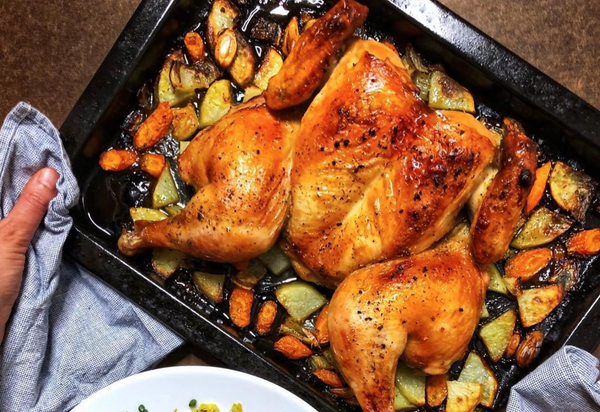Not feeling like having ramen for the fifth time this week? Trying to be healthy, but don't want salad every day? Is your college-sized wallet crying from all those late night deliveries you've ordered this week? Food is a beautiful part of life and Liam's here to give you some tips on how to make some healthy and delicious meals without breaking the bank.
Being in college we're forced to do all the magic tricks of life that our parents used to do for us like laundry, food, or buying toilet paper. Food is arguably the most important, and once you learn tricks to save money in the store it just makes everything easier.
Protein: Protein is a huge part of a well balanced diet even if you're not "tryna be swole" as the kids say these days, but it also tends to be more expensive unless you know where to look. Chicken breasts are great, but tend to cost about $3-4 per pound which adds up if you are rolling with a college budget. On the other hand, a five pound case of bone-in skin-on chicken thighs is $6. Deboning is easy once you get the hang of it, and if you cut off the extra fat you'll be good to go . If you eat meat, ground beef and ground turkey are great options (the turkey is a little more expensive) because they're easy to cook and can be thrown in almost anything to add some flavor and texture. Turkey has 3% fat so the occasional turkey burger is awesome for you. If you don't eat meat, fish is healthy and cheap depending on the area and go with chickpeas if you're vegan or vegetarian (falafel is amazing).
Fruits and Veggies: This section relies heavily on preference, and there are many inexpensive yet delicious foods that come out of the produce section whether you eat them alone or you use them to enhance flavors of other food. Some prime examples of cheap produce are potatoes, onions, cabbage, broccoli, carrots, corn, bananas, apples, or a partridge in a pear tree. The most important part of saving money in the produce section is WEIGH EVERYTHING; you never want to get to checkout and find that you somehow managed to gather $100 worth of peaches. Overall, fruit is fantastic for a nice sweet kick, and if seasoned properly, any vegetable can taste amazing.
Herbs and Spices: There's nothing more revolting than a big slab of meat with no spice, so make sure to leave room in your budget for some pizzaz. By now you probably have a good sense of what flavors you like/dislike and through some experimentation you'll find a nice group of seasonings you enjoy. Salt and pepper are obvious musts, garlic and onion powder are fantastic on meats and veggies alike, try something spicy like cayenne to keep things interesting, and any of the Simon and Garfunkel herbs work for anything. Nothing here is going to break the bank, so when you go shopping just add one or two spices at a time until you're happy.
Random Tips:
- Never go to the grocery store hungry
- For just $0.30 more than the cost of one can, dried beans give you up to three times the amount in a can after soaking overnight
- Rice is boring on its own, so add your own seasonings or use chicken broth instead of water
- It's always better to overcook meat than undercook
- Recipes are guidelines, not a rule book
- Set a day to do all or most of your cooking for the week, it saves time and effort throughout the rest of the week and gives you something nutritious to eat other than ramen or Whataburger.
I know that buying fresh ingredients and making your own food sounds intimidating, but cooking isn't only a valuable life skill to impress your lady or man with, it's something that can make you feel better in general. Even if everything else in your life might be a disaster, at least you can make some bomb-ass chicken stir fry. Cooking something nutritious is an accomplishment that will make you feel awesome and eating it will make you feel even better. Have fun kids, and don't burn the house down.






















